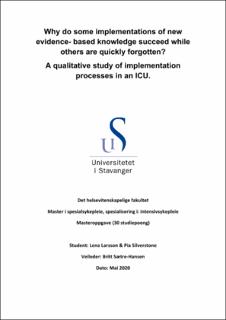| dc.contributor.advisor | Hansen, Britt Sætre | |
| dc.contributor.author | Larsson, Lena | |
| dc.contributor.author | Silverstone, Pia | |
| dc.date.accessioned | 2020-08-05T14:06:41Z | |
| dc.date.available | 2020-08-05T14:06:41Z | |
| dc.date.issued | 2020-05 | |
| dc.identifier.uri | https://hdl.handle.net/11250/2670982 | |
| dc.description | Master's thesis in Critical Care Nursing | en_US |
| dc.description.abstract | ABSTRACT
Introduction: New evidence based practices are continuously introduced in the dynamic, fast changing and highly specialized environment of an Intensive Care Unit. There are a number of theories that predict the possible success of a new implementation and there exist numerous well-documented factors that need to be in place in order for a sustainable change of practice to occur. Despite this it is still difficult to implement new knowledge which is of sustainable use in the ICU. The TALK clinical debriefing tool has recently been introduced in the ICU of a Norwegian university hospital as part of a larger EU funded project based on the World Health Organization’s recommendation that clinical staff use debriefing as a tool to improve patient safety and staff well-being.
Aim: The aim of this study is to identify enablers and barriers in the implementation of evience based practices in the ICU, using the implementation of the TALK clinical debrief tool as an example.
Methods: A qualitative study: Focus groups and individual interviews with critical care nurses, doctors and nurse managers were performed in an Intensive Care Unit at a Norwegian university hospital. In the analysis Qualitative Content Analysis was applied.
Results: The results suggest that, in general, there is a climate and a willingness to change but that it is dependent upon the potential gains for clinical and personal improvement. Further, there must exist an implementation system with a clear follow- up and follow-through plan for a change to become sustainable.
Conclusion: There were indications that improvements in organizational implementation planning are needed, including consideration of staff expectations, the perceived need for the change, how the potential change fits in with existing routines and if there are any other major organizational changes which can occur that can create conflict. All of these should be considered when introducing a change. | en_US |
| dc.language.iso | eng | en_US |
| dc.publisher | University of Stavanger, Norway | en_US |
| dc.relation.ispartofseries | Masteroppgave/UIS-HV/2020; | |
| dc.rights | Navngivelse 4.0 Internasjonal | * |
| dc.rights.uri | http://creativecommons.org/licenses/by/4.0/deed.no | * |
| dc.subject | helse- og sosialfag | en_US |
| dc.subject | implementation | en_US |
| dc.subject | evidence- based practice | en_US |
| dc.subject | critical care nurses | en_US |
| dc.subject | intensive care | en_US |
| dc.subject | PARIHS | en_US |
| dc.subject | TALK clinical debrief | en_US |
| dc.subject | ICU | en_US |
| dc.subject | spesialsykepleie | en_US |
| dc.subject | intensiv sykepleie | en_US |
| dc.subject | intensive care nurses | en_US |
| dc.title | Why do some implementations of new evidence-based knowledge succeed, while others are quickly forgotten? A qualitative study of implementation processes in an ICU. | en_US |
| dc.type | Master thesis | en_US |
| dc.subject.nsi | VDP::Medisinske Fag: 700::Helsefag: 800::Sykepleievitenskap: 808 | en_US |

